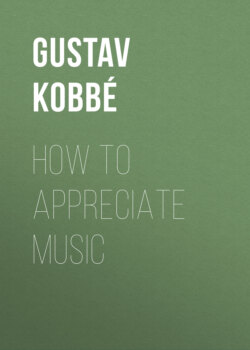Читать книгу How to Appreciate Music - Gustav Kobbé - Страница 25
На сайте Литреса книга снята с продажи.
Science versus Feeling.
ОглавлениеIn fact, the person who is so well versed in the science of music that he can mentally analyze a composition while listening to it is apt to be so absorbed in the mere process of technical analysis that he misses its esthetic, its emotional significance. Thus a person may 62 be very musical without being musical at all. He may have profound knowledge of music as a science and remain untouched by music as an art, just as a physicist may be an authority on the laws of light and color, yet stand unmoved before a great painting. With some people music is all science, with others all art, and I think the latter have the better of it. A musical genius is equipped both ways. The great composer employs the science of music as an aid in giving expression to his creative impulse. He makes science of service to the cause of art. Otherwise, while he might produce something that was absolutely correct, it would make no artistic appeal whatsoever. Thousands of symphonies have been composed, performed and forgotten. They were “well made,” constructed with scientific accuracy from beginning to end, but had no value as art; and music is a profound science applied to the production of a great art.
The composer, then, masters the science of music and bends it to his genius. If he is a great genius, he soon will discover that certain rules which his predecessors regarded as hard and fast, as inviolable, can be violated with impunity. He will discover new tone combinations, and thus enrich the science and make it serve the purposes of the art with greater efficiency than before he came upon the scene. And always the composers who have grown gray under the old system, the system upon which the new genius is grafting his new ideas, and the theorists and critics, who are slaves of tradition, will throw up their hands in horror and cry out that he is despoiling the art and robbing it of all that is sacred and beautiful, whereas he is adding to its scope 63 and potency. Did not even so broad-minded a composer as Schumann say, “The trouble with Wagner is that he is not a musician”? So far was Wagner ahead of his time! While the great composer nearly always begins where his predecessors left off, he is sure to outstrip them later on. Even so rugged a genius as Beethoven is somewhat under Mozart’s influence in his first works, and Wagner’s “Rienzi” is distinctly Meyerbeerian. But genius soon learns to soar with its own wings and to look down with indifference upon the little men who are discharging their shafts of envy, malice and ignorance.
